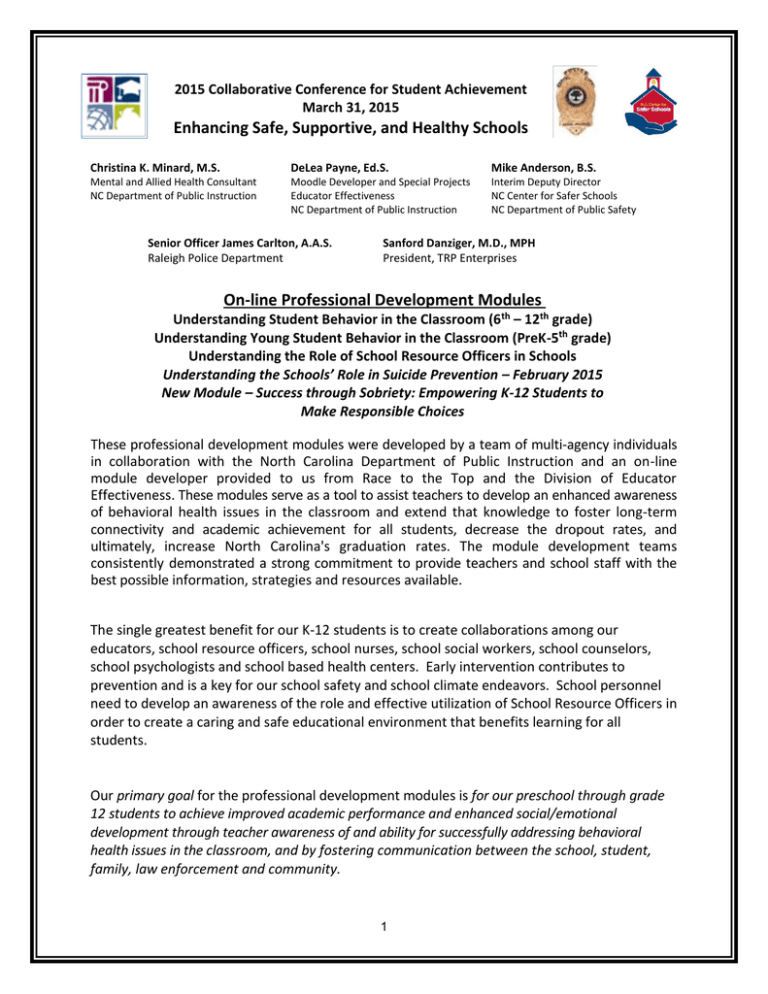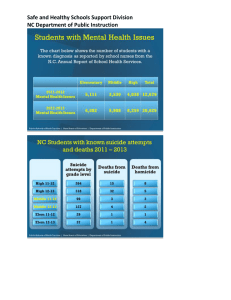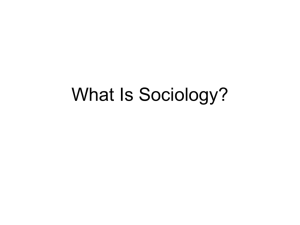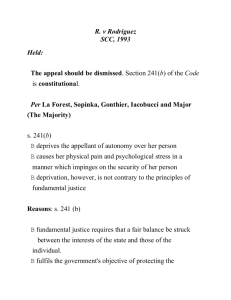Enhancing Safe, Supportive, and Healthy Schools March 31, 2015
advertisement

2015 Collaborative Conference for Student Achievement March 31, 2015 Enhancing Safe, Supportive, and Healthy Schools Christina K. Minard, M.S. DeLea Payne, Ed.S. Mike Anderson, B.S. Mental and Allied Health Consultant NC Department of Public Instruction Moodle Developer and Special Projects Educator Effectiveness NC Department of Public Instruction Interim Deputy Director NC Center for Safer Schools NC Department of Public Safety Senior Officer James Carlton, A.A.S. Raleigh Police Department Sanford Danziger, M.D., MPH President, TRP Enterprises On-line Professional Development Modules Understanding Student Behavior in the Classroom (6th – 12th grade) Understanding Young Student Behavior in the Classroom (PreK-5th grade) Understanding the Role of School Resource Officers in Schools Understanding the Schools’ Role in Suicide Prevention – February 2015 New Module – Success through Sobriety: Empowering K-12 Students to Make Responsible Choices These professional development modules were developed by a team of multi-agency individuals in collaboration with the North Carolina Department of Public Instruction and an on-line module developer provided to us from Race to the Top and the Division of Educator Effectiveness. These modules serve as a tool to assist teachers to develop an enhanced awareness of behavioral health issues in the classroom and extend that knowledge to foster long-term connectivity and academic achievement for all students, decrease the dropout rates, and ultimately, increase North Carolina's graduation rates. The module development teams consistently demonstrated a strong commitment to provide teachers and school staff with the best possible information, strategies and resources available. The single greatest benefit for our K-12 students is to create collaborations among our educators, school resource officers, school nurses, school social workers, school counselors, school psychologists and school based health centers. Early intervention contributes to prevention and is a key for our school safety and school climate endeavors. School personnel need to develop an awareness of the role and effective utilization of School Resource Officers in order to create a caring and safe educational environment that benefits learning for all students. Our primary goal for the professional development modules is for our preschool through grade 12 students to achieve improved academic performance and enhanced social/emotional development through teacher awareness of and ability for successfully addressing behavioral health issues in the classroom, and by fostering communication between the school, student, family, law enforcement and community. 1 Understanding Young Student Behavior in the Classroom Understanding the School’s Role in Suicide Prevention 2 Understanding Student Behavior in the Classroom Understanding Young Student Behavior in the Classroom Introduction and Purpose Introduction and Purpose Scope of Behavioral Health Concerns Scope of Behavioral Health Concerns in Early Grades Behavioral Health Concerns and Symptoms Introduction to Early Childhood Education Trauma Statistics and Information Understanding Social and Emotional Development Substance Abuse Positive Self-Esteem / Enhancing Self-Esteem High School Students and Gambling What is Self-Efficacy? / Self-Efficacy Development Tips for Talking with Teens Classroom Environments Strategies for Improving Academic Achievement Challenging Behaviors in Young Students Empower Students to Manage Their Own Behavior Classroom Interventions Anxiety, Depression, or Self-Esteem Issues Bullying Prevention and Intervention at Schools Working with Families When to Involve Law Enforcement with Young Students Youth Suicide Prevention – Signs and Symptoms Children and Grief Students of Military Families Early Childhood Trauma / Trauma Strategies Teens and Foster Care Youth Suicide and Prevention Students and Homelessness Substance Abuse and Young Students When to Involve the School Resource Officer Students of Military Families Types of Student Crimes and Consequences Young Students in Foster Care and Homelessness Professional and Community Resources Role of School Counselor, Nurse, Psychologist, Resource Officer, and Social Worker Role of School Counselor, Nurse, Psychologist, Resource Officer, and Social Worker Transcript or Printable CEU Certificate Transcript or Printable CEU Certificate 3 Understanding the Role of School Resource Officers in Schools History of the School Resource Officer Program Code of Ethics for SROs and Teachers Duties, Responsibilities & Qualifications for a SRO When to Involve Law Enforcement in Classrooms Strategies for School Resource Officers School Resource officers and Home Visits Observations by the School Resource Officer Youth and Gangs Guide Student Searches by SROs and Principals Bullying and Cyberbullying Counseling Through Classroom Presentations Criminal Investigations School Safety Bill – House Bill 452 Team Based Framework for Suicide Prevention/Intervention Principal/School Resource Officer Relationship Exceptional Students NC Critical Incident Response Strategies for Educators Protocol for When to Call the SRO Building Relationships with Staff & Students Juvenile Miranda Warning – Age Requirements Custodial Statement of Juvenile Under 14 Years Old Special Statutes for Parents & Legal Guardians 16 Reportable Offenses that Schools Must Report Juvenile Justice System Juveniles as Victims Teen Court Program G.S. 7B-1706(c) Teen Court Re-Entry to the School Setting School Based Health Center Staff School Counselors School Nurses School Psychologists School Social Workers School Support Team Meeting Transcript or Printable CEU Certificate Teacher’s Guide 4 Understanding the School’s Role in Suicide Prevention Module Overview – DeLea Vision Statement and Learning Objectives Understanding the Reasons for Suicide Myths & Misconceptions Why Do Youth Die By Suicide Risk Factors Associated with Suicide in Youth Video and Activity Warning Signs and Symptoms of Suicide Signs and Symptoms of Suicide Quiz and Activity Strategies for Educators Ways to start conversations with students You may be thinking, “What can I say to help?” Take All Suicide “Talk” Seriously What can educators and schools do to help?) Crisis Intervention Specialist (Suicide Risk Response Coordinator What we need to teach Lesson Plans for Educators Social Media Anonymous App for Students and Educators Activity School Support Teams Student Support Services Overview Sample Stresses, Symptoms, and Feelings Checklist Sample School Action Plan and Parent Contact School Resource Officers Additional Resources Teacher’s Guide Transcript or Printable CEU Certificate 5 Access the Modules Go to: https://center.ncsu.edu/ncpd/ Create an account Authenticate your account 1. Log into https://center.ncsu.edu/ncdp/ with your authenticated username and password 2. You will be prompted to log in through NC Education. Log in you will be sent back to NC Education PD opening page. 3. The module titles are found on the opening page of the site. Click on the module title to enroll in the course. There will be a button to self-enroll. (No cost to user or to school system) Contact Information Christina K. Minard, M.S. Mental Health and Allied Health Consultant NC Department of Public Instruction Chris.Minard@dpi.nc.gov DeLea Payne, Ed.S. Moodle Developer & Special Projects Educator Effectiveness NC Department of Public Instruction DeLea.Payne@dpi.nc.gov 6




